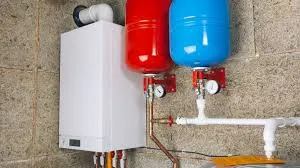Tankless water heaters are a growing trend in households for good reasons. Unlike traditional storage tank heaters, tankless systems heat water directly, providing hot water on demand. Many homeowners are upgrading to tankless water heaters to reduce energy consumption, save space, and enjoy an uninterrupted hot water supply. Although tankless systems may require a higher initial investment, their benefits, including long-term savings and efficiency, outweigh this cost. We will explore why upgrading to a tankless water heater from Integrity Plumbing, Inc. could be a smart choice for your home, offering practical insights into its numerous advantages.
Energy Efficiency and Savings
One of the primary reasons many homeowners consider upgrading to a tankless water heater is the potential for energy savings. Unlike traditional water heaters that keep an extensive reservoir of water hot at all times, tankless water heaters operate only when hot water is needed. This on-demand system significantly reduces the energy lost in standby heat, where heat dissipates from the tank’s stored water. For example, traditional water heaters may reheat water multiple times throughout the day, even when no one uses it, resulting in wasted energy.
In contrast, tankless systems only heat water when the faucet is turned on, using energy much more efficiently. This can reduce energy bills, especially in households with high hot water usage. Depending on the system and usage, upgrading to a tankless water heater can reduce water heating energy consumption by up to 30%. These savings are even more significant in larger households, where hot water demand is high and continuous. Although the initial cost of a tankless system is higher, the long-term savings on utility bills can make it a financially viable option over the years.
Endless Supply of Hot Water
Another compelling reason to switch to a tankless water heater is the endless hot water supply. In traditional water heaters, the storage tank holds a limited amount of hot water, and once that tank is depleted, you must wait for it to refill and reheat. This can be frustrating for families where multiple people need hot water consecutively, such as for showers, dishwashing, or laundry.
Tankless water heaters, however, eliminate this issue. Since the water is heated on demand, you don’t run out of hot water, no matter how many showers or appliances are running simultaneously. The system heats the water as it passes through, ensuring a continuous flow for as long as necessary. This feature mainly benefits households with larger families or high water usage, as everyone can access hot water without waiting. The convenience of having hot water on demand improves daily living, making tasks like bathing, cooking, and cleaning more efficient and enjoyable.
Space-Saving Design
Tankless water heaters offer a distinct advantage in terms of space savings. Traditional storage tank heaters can be bulky, occupying significant floor space in basements, closets, or utility rooms. These tanks range in size, often holding 30 to 80 gallons of water, and their large dimensions can limit the available space for other storage or appliances. On the other hand, tankless systems are much more compact and can be installed in smaller, out-of-the-way areas, such as on a wall or in a tight closet.
This space-saving design is precious in smaller homes, apartments, or condos where maximizing available room is essential. In addition to freeing up floor space, the sleek and compact design of tankless heaters offers greater flexibility in where the system can be installed. With fewer limitations on placement, you can position the unit closer to where hot water is used most frequently, reducing the time it takes for hot water to reach your faucet. This setup saves space and can enhance your home’s overall efficiency.
Longevity and Durability
One of the lesser-known benefits of tankless water heaters is their extended lifespan compared to traditional systems. Conventional storage-tank water heaters typically last 10 to 15 years, depending on maintenance and usage. In contrast, tankless water heaters can last up to 20 years or more with proper care. This increased longevity is partly due to the absence of a large tank that can corrode over time. Since tankless systems don’t hold water for extended periods, there’s less chance for rust and mineral buildup, which can degrade the system’s efficiency and lead to early failure.
Additionally, most tankless units come with replaceable parts, allowing for more straightforward repairs and maintenance extending their lifespan. Tankless systems’ increased durability and longevity make them a worthwhile investment for homeowners looking for a long-term solution to their water heating needs. Over the years, this durability has reduced the need for frequent replacements, saving homeowners the hassle and cost of replacing their water heaters every decade.
Upgrading to a tankless water heater offers numerous advantages, from energy savings and efficiency to space-saving designs and endless hot water supply. While the initial investment may seem higher, the long-term benefits, including reduced utility bills, increased durability, and a smaller environmental footprint, make it a worthwhile consideration for homeowners. The convenience of never running out of hot water, coupled with these systems’ compact design and extended lifespan, makes them a smart choice for many households. Whether you’re looking to save money, reduce your environmental impact, or improve your home’s functionality, switching to a tankless water heater is an investment that can pay off in multiple ways over the years.






